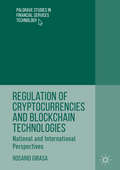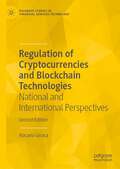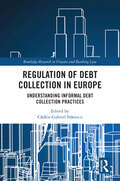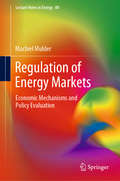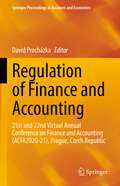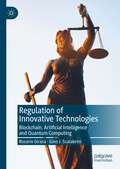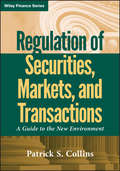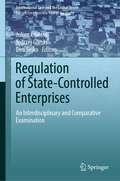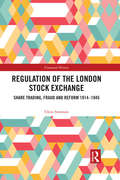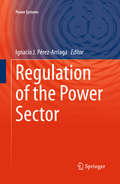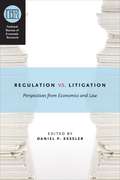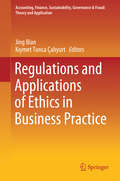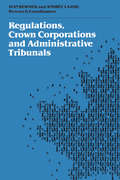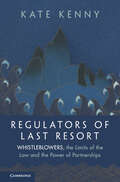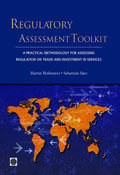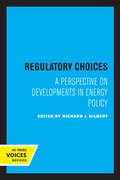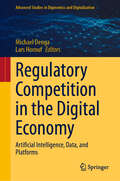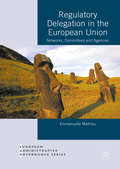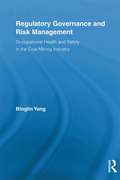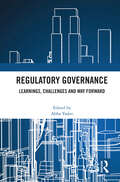- Table View
- List View
Regulation in the European Electricity Sector (Routledge Research in Energy Law and Regulation)
by Maciej M SokołowskiSince the very beginning of European integration, electricity has been within the legal sphere of the EU. Much of this is found within the binding European acts making up the framework of the Energy Packages. The established legal institutions have had a significant impact on the shape of the energy market in Europe. Nevertheless, the European energy market still seems to be developing, as demonstrated by the current lively discussion about the state of the Energy Union. Regulation in the European Electricity Sector delves into European energy law and reflects on some of the primary issues related to the public legal impact on the European energy sector. The book offers a brief explanation of the background operation of the electricity sector, as well as liberalisation within the area, and traces the evolution of the EU’s approach towards the issue of public law regulation within the electricity sector. Finally, the book presents an analysis of European and national laws, considering their interpretation, and explores the future of public law regulation. Aimed at giving the reader a deep insight into a nature of the state’s presence in the power sector, this book will be of great interest to students and scholars of EU energy law and policy.
Regulation of Cryptocurrencies and Blockchain Technologies: National and International Perspectives (Palgrave Studies in Financial Services Technology)
by Rosario GirasaThe book highlights the rise of Bitcoin, which is based on blockchain technology, and some of the many types of coins and tokens that emerged thereafter. Although Bitcoin and other cryptocurrencies have made national and international news with their dramatic rise and decline in value, nevertheless the underlying technology is being adopted by both industry and governments, which have noted the benefits of speed, cost efficiency, and protection from hacking. Based on numerous downloaded articles, laws, cases, and other materials, the book discusses the digital transformation, the types of cryptocurrencies, key actors, and the benefits and risks. It also addresses legal issues of digital technology and the evolving U.S. federal regulation. The varying treatment by individual U.S. states is reviewed together with attempts by organizations to arrive at a uniform regulatory regime. Both civil and criminal prosecutions are highlighted with an examination of the major cases that have arisen. Whether and how to tax cryptocurrency transactions both in the U.S. and internationally are analyzed, and ends with a speculative narrative of future developments.
Regulation of Cryptocurrencies and Blockchain Technologies: National and International Perspectives (Palgrave Studies in Financial Services Technology)
by Rosario GirasaThis second edition further explores the regulatory landscape of cryptocurrency, highlighting the rise of Bitcoin, which is based on blockchain technology, and some of the many types of coins and tokens that emerged thereafter. Although Bitcoin and other cryptocurrencies have made national and international news with their dramatic rise and decline in value, nevertheless the underlying technology is being adopted by both industry and governments, which have noted the benefits of speed, cost efficiency, and protection from hacking. Based on numerous downloaded articles, laws, cases, and other materials, the book discusses the digital transformation, the types of cryptocurrencies, key actors, and the benefits and risks. It also addresses legal issues of digital technology and the evolving U.S. federal regulation. The varying treatment by individual U.S. states is reviewed together with attempts by organizations to arrive at a uniform regulatory regime. Both civil and criminal prosecutions are highlighted with an examination of the major cases that have arisen. This second edition specifically explores the creation of stablecoins, governments issuance of their own versions of digital currencies, new regulations that have been enacted and promulgated, and a clearer examination of futuristic evolutions that potentially will have a major impact upon the current cited technologies.
Regulation of Debt Collection in Europe: Understanding Informal Debt Collection Practices (Routledge Research in Finance and Banking Law)
by Cătălin-Gabriel StănescuDue to the absence of due process and other procedural guarantees generally offered by judicial enforcement, informal debt collection practices (IDCPs) can become abusive, harming both consumers and the economy by threatening consumers’ physical, psychological, and economic wellbeing; exposing law-abiding debt collectors to unfair competition; undermining the financial system, and negatively impacting social peace by resorting to criminal activity. The need to control and harmonize IDCPs surfaced in connection with the European Commission’s Action Plan to tackle the high level of non-performing loans caused by the financial crisis and the Covid-19 pandemic - specifically the Proposal for a Directive on Credit Servicers, Credit Purchasers, and the Recovery of Collateral (CSD). Harmonizing the regulation of abusive IDCPs is vital for several reasons. First, IDCPs have a cross-border dimension due to the freedom of movement, enabling debt collection operations across the internal market. Second, the internal market’s size amounts to over 450 million citizens potentially exposed to abusive IDCPs. The regulatory frameworks addressing IDCPs in the EU display divergent characteristics that may be difficult to navigate and require creating a level-playing field for consumers and debt collectors, especially when approaches vary at Member State level. This book addresses this gap by providing a comprehensive guide to regulating informal debt collection practices in eight Member States (MS) of the EU and the United Kingdom (UK). It serves as a comparative law instrument for implementing the recently adopted Credit Servicers Directive (CSD). It will be important reading for students, academics and stakeholders with an interest in debt collection practices and the law.
Regulation of Energy Markets: Economic Mechanisms and Policy Evaluation (Lecture Notes in Energy #80)
by Machiel MulderThis textbook explains the main economic mechanisms behind energy markets and assesses how governments can implement policies to improve how these markets function. Adopting a micro-economic perspective, the book systematically analyses the various types of market failures on the electricity and gas markets as well as coal, oil, hydrogen and heat markets to identify government policies that can improve welfare. These shortcomings include the natural monopoly and the public-good character of energy infrastructures; market power resulting from inflexibility of supply and demand; international trade restrictions; negative externalities concerning the use of fossil energy; positive externalities concerning innovative new energy technologies; information asymmetries with regard to the product characteristics of energy commodities; and other public concerns, such as energy poverty. In turn, readers will learn about various measures that governments can use to address these market failures, including incentive regulation for electricity grids; international integration of wholesale energy markets; environmental regulatory measures like emissions trading schemes; subsidy schemes for new technologies; green-energy certificate schemes; and energy taxes. Given its scope, the book will appeal to upper-undergraduate and graduate students from various disciplines who want to learn more about the economics and regulation of energy systems and markets.
Regulation of Finance and Accounting: 21st and 22nd Virtual Annual Conference on Finance and Accounting (ACFA2020-21), Prague, Czech Republic (Springer Proceedings in Business and Economics)
by David ProcházkaThis edition provides a mix of research perspectives to examine the economic and non-economic outcomes of global developments in financial regulation, monetary and fiscal measures, or sustainable development, with a tailored focus on specifics in emerging and transitioning countries. The volume combines a mix of approaches to investigate relevant newly emerged topics (e.g., economics of emissions, corporate social responsibility reporting) as well as traditional issues requiring new approaches (e.g., exchange rate mechanisms, investment strategies, the impact of corporate reporting on economic fundamentals). Such a comprehensive view of contemporary economic phenomena makes the volume attractive not only to academia, but also to regulators and policymakers, when deliberating on the potential outcomes of competing regulatory mechanisms.
Regulation of Innovative Technologies: Blockchain, Artificial Intelligence and Quantum Computing
by Rosario Girasa Gino J. ScalabriniThis book explores the regulation of emerging technologies. Developments such as bitcoin (based on blockchain technology), artificial intelligence, quantum computing, and other technical advances have the potential to revolutionize many aspects of everyday life. As with other significant occurrences, especially when coupled by financial rewards, there are the inevitable attempts to reap gains unlawfully. This book examines the legal and regulatory enactments that attempt to undermine the risks to society as well as the dangers to individual freedoms that the technologies present when abused by governmental and non-governmental authorities. Included are discussions of the dangers to the right of privacy posed by facial recognition, physical location tracking, automated license plate recognition (ALPR) and other evolving applications of technology. This book is an invaluable resource for those interested in the regulation of emerging technologies particularly as they relate to blockchain, artificial intelligence, and the most current advances in quantum computing. Emphasis is focused on invasion of privacy, particularly by government authorities, antitrust implications of private companies and the efforts of international entities to counter alleged abuses by them.
Regulation of Securities, Markets, and Transactions
by Patrick S. CollinsThe ultimate guide to the current rules and regulations that govern the securities industry?including amendments in 2010Providing readers with expert coverage of domestic securities regulation, this book fills the need for coverage of securities regulations, defining, describing, and explaining everything professionals need to know about domestic securities regulation.Examines the current securities rulesProvides an overview of the latest regulations for this industryIncludes a description of the various government regulations of securities markets, and securities transactionsSince the corporate scandals of 2002, this industry has seen intense scrutiny of how it is regulated. Regulation of Securities, Markets, and Transactions demystifies the new laws and regulations with straightforward, to-the-point coverage professionals need.
Regulation of State-Controlled Enterprises: An Interdisciplinary and Comparative Examination (International Law and the Global South)
by Julien Chaisse Jędrzej Górski Dini SejkoThis book analyses actual and potential normative (whether legislative or contractual) conflicts and complex transnational disputes related to state-controlled enterprises (SCEs) operations and how they are interwoven with the problem of foreign direct investment. Moreover, SCEs also fall within the remit of international political economy, international economics and other SCE-related fields that go beyond purely legal or regulatory matters. In this connection, research on such economic and political determinants of SCE’s operations greatly informs and supplements the state of knowledge on how to best regulate cross-border aspects of SCE’s and is also be covered in this book. The book also aims to analyse the “SCE phenomenon” which includes a wide panoply of entities that have various structures with different degrees of control by states at the central or regional level, and that critically discuss the above-mentioned overlapping legal economic and political systems which can emerge under various shades of shadows casted by governmental umbrellas (i.e., the control can be exercised through ownership, right to appoint the management, and special-voting-rights). The chapters in this book are grouped, so as to address cross-border investment by and in SCE, into four coherent major parts, namely --- (i) the regulatory framework of state capitalism: laws, treaties, and contracts; (ii) economic and institutional expansion of state capitalism; (iii) the accountability of state capitalism: exploring the forms of liabilities; and (iv) regional and country perspectives. Contributions address the core theme from a broad range of SCE and international economic regulations, including but not limited to competition law, WTO law, investment law, and financial/monetary law. They also cover the new emerging generation of Free Trade Agreements (EU-Vietnam FTA, EU China investment treaty, Regional Comprehensive Economic Partnership; and the coordination between treaty systems). The book is a valuable addition and companion for courses, such as international trade law, international law of foreign investment, transnational law, international and economic development, world politics, law of preferential trade agreements, international economics, and economics of development.
Regulation of the London Stock Exchange: Share Trading, Fraud and Reform 1914–1945 (Financial History #29)
by Chris SwinsonIn 1914, the notion of statutory regulation of trading in shares was anathema to both the Government and the London Stock Exchange. By 1945, a statutory scheme of regulation had been introduced. This book serves to: Track the steps by which this outcome came about, Explain why the Exchange felt obliged in the process to abandon long-cherished policies, Analyse the forces which led to it, and Account for the form in which it was implemented. Throughout the period, the attitudes of both the Stock Exchange and Government were affected by widening interest in share ownership, the increasing tendency for business interests to look to the Exchange for long-term finance, and the increasing challenge of financing the Government’s expenditure. At a disaggregated level, the market was able to respond to changing circumstances taking advantages of opportunities and weaknesses. At an aggregated level, the Exchange was not able to foresee the implications of change or to forestall unfortunate consequences. This exposed the weakness of the criminal justice system and its failure to serve as a deterrent for abuse. This study, the only book to take full account of the documents held by the National Archives in relation to the Bodkin Committee, examines the stages by which share trading in the United Kingdom came to be a statutorily regulated activity and by which the London Stock Exchange moved from being antagonistic towards public regulation in 1914 to lobbying in 1944 for the new scheme to be implemented.
Regulation of the Power Sector
by Ignacio J. Pérez-ArriagaRegulation of the Power Sector is a unified, consistent and comprehensive treatment of the theories and practicalities of regulation in modern power-supply systems. The need for generation to occur at the time of use occasioned by the impracticality of large-scale electricity storage coupled with constant and often unpredictable changes in demand make electricity-supply systems large, dynamic and complex and their regulation a daunting task. Arranged in four parts, this book addresses both traditional regulatory frameworks and also liberalized and re-regulated environments. First, an introduction gives a full characterization of power supply including engineering, economic and regulatory viewpoints. The second part presents the fundamentals of regulation and the third looks at the regulation of particular components of the power sector in detail. Advanced topics and subjects still open or subject to dispute form the content of Part IV. In a sector where regulatory design is the key driver of both the industry efficiency and the returns on investment, Regulation of the Power Sector is directed at regulators, policy decision makers, business managers and researchers. It is a pragmatic text, well-tested by the authors' quarter-century of experience of power systems from around the world. Power system professionals and students at all levels will derive much benefit from the authors' wealth of blended theory and real-world-derived know-how.
Regulation vs. Litigation: Perspectives from Economics and Law (National Bureau of Economic Research Conference Report)
by Daniel P. KesslerThe efficacy of various political institutions is the subject of intense debate between proponents of broad legislative standards enforced through litigation and those who prefer regulation by administrative agencies. This book explores the trade-offs between litigation and regulation, the circumstances in which one approach may outperform the other, and the principles that affect the choice between addressing particular economic activities with one system or the other. Combining theoretical analysis with empirical investigation in a range of industries, including public health, financial markets, medical care, and workplace safety, Regulation versus Litigation sheds light on the costs and benefits of two important instruments of economic policy.
Regulations and Applications of Ethics in Business Practice (Accounting, Finance, Sustainability, Governance & Fraud: Theory and Application)
by Kıymet Tunca Çalıyurt Jing BianThis book presents a variety of discussions from different countries about regulations and applications of ethics in business practice. It demonstrates how Ethics, both in the world of business and in academic life, is consistently a central and unavoidable issue that institutions must devise new regulations on a regular basis to address. Given that applying such regulations becomes complicated in a global business landscape and that International companies have lost large amounts of revenues due to fraudulent activities, the book provides insights for professionals in business world to teach, learn, apply, measure and report on companies' daily business. Business and Professional Ethics: Theories, Standards, and Analysis is essential reading for researchers and students in business schools around the world.
Regulations and International Trade
by Kaoru Nabeshima Etsuyo Michida John HumphreyThis book evaluates the evolution of regulatory policy in advanced countries and discusses how, due to globalization, policy changes in one country have a knock-on effect in others. Separated in two parts, the first half focuses on policy in developed countries and regulatory diffusion from Europe to Asia. The second part looks at the business impact of policy developments in a number of Southeast Asian countries. Key chapters discuss Thailand's response to EU chemical regulations, the diffusion of private food standards, and the effect of chemical safety standards in Malaysia and Vietnam. These contributions are written by leading scholars in the field and the book is likely to be of interest to students, researchers and policy makers concerned with regulation changes in East Asia.
Regulations in the Energy Industry: Financial, Economic and Legal Implications
by André Dorsman Özgür Arslan-Ayaydin James ThewissenThis book provides a broad overview of the financial, economic and legal implications of energy industry regulations in various countries. In light of significant changes around the globe, it analyses various institutions that are involved in regulative measures, and based on various country studies, it offers insights into how energy sector regulations differ across countries with different market structures and institutions. Covering major topics such as laws and regulations geared to market competition and sustainability and the impact of noncompliance to regulations, from the perspectives of financial markets, and financial risks, the book is divided into four parts: Part I Regulations: price and trade controls; Part II. Non-price & trade control regulations; Part III: Compliance with regulations; and Part IV: Market issues and regulation. It will appeal to scholar in economics, finance and related fields as well as to policymakers and practitioners in the energy industry. This is the seventh volume in a series on energy organized by the Centre for Energy and Value Issues (CEVI). The previous volumes in the series were: Financial Aspects in Energy (2011), Energy Economics and Financial Markets (2012), Perspectives on Energy Risk (2014), Energy Technology and Valuation Issues (2015), Energy and Finance (2016) and Energy Economy, Finance and Geostrategy (2018).
Regulations, Crown Corporations and Adminstrative Tribunals: Royal Commission
by Ivan Bernier Andrée LajoieThis is the third of six volumes dealing with Law, Society and the Economy (see list in back of book), included in the Collected Research Studies of the Royal Commission on the Economic Union and Development Prospects for Canada.This volume surveys administrative law in its various manifestations and considers new themes and issues that are likely to affect the subject. Challenging generally accepted views, the contributors discuss such topics as the structures and processes of Canadian administrative tribunals, Crown corporations as an instrument of economic intervention, and the use of delegated legislation as the preferred instrument of government regulations.
Regulators of Last Resort: Whistleblowers, the Limits of the Law and the Power of Partnerships
by Kate KennyHow do public whistleblowers prevail despite employers' attempts to silence them? Whistleblowing is essential for raising awareness of extreme wrongdoing within organizations yet, despite changing laws designed to offer more protection, workers exposed for public disclosures frequently find themselves the targets of extreme retaliation. Featuring high-profile cases from Amazon, Facebook and Theranos, Kate Kenny reveals the critical - and often unseen - role that skilled allies play in supporting whistleblowers when official channels fail. Novel and sophisticated means of silencing require new strategies for whistleblowing – and supportive partners are key. In this new era of whistleblowing, oppressive lawfare is used against truth-telling workers, and official channels can be weaponized. Yet powerful employers can still make mistakes. Regulators of Last Resort shows how aggressive reprisals can yield surprising advantages for dissenters. Working in partnership with advocates, public whistleblowers can find strategies to survive, persist and bring their disclosures to light.
Regulatory Assessment Toolkit
by Sebastián Sáez Martín MolinuevoThe services sector--ranging from telecommunications and banking to business processing and outsourcing--is increasingly recognized as part and parcel of any trade strategy, both as a source of export diversification in its own right as well as a key component of a country's competitiveness. Unlike trade in goods, which is governed by border measures that regulate the entry of foreign merchandise, international trade in services is subject to a wide range of domestic laws and regulations that govern access and operations by both domestic and foreign suppliers. While such regulations are essential where market failures or externalities exist and to ensure non-economic objectives, it is often difficult to differentiate between legitimate policy objectives and protectionist measures that introduce distortions and inefficiency in the market. An unnecessarily restrictive regulatory framework limits the potential of the services sector to develop, and undermines the export opportunities and competitiveness of domestic businesses. This toolkit offers a practical methodology to assess the impact of services regulations: the Regulatory Assessment on Services Trade and Investment (RASTI). The RASTI helps to evaluate whether a country's regulatory framework is promoting the development of an efficient domestic services market, and offers guidance on how to ensure that services regulation correctly addresses market failures and achieves public policy goals. The authors propose three steps towards a trade-related regulatory assessment: - mapping laws and regulations that affect trade and investment in services, and assessing the regulatory process and institutional arrangements; - wherever possible, providing a quantitative assessment of the impact of regulations on performance and market structure, including prices, quality and access; and - identifying alternative regulations and institutional set-ups that promote an enabling regulatory environment for services trade while achieving the desired policy goals. Performing a regulatory assessment can serve multiple purposes depending on the circumstances and the needs of the evaluators, including bridging information gaps; supporting regulatory reform; supporting trade negotiations; assessing regulatory performance; and promoting better regulatory practices. The Regulatory Assessment Toolkit will be of particular interest to policy makers and government officials from regulatory bodies, experts at development banks and donor agencies, and academics and researchers in the field of economic regulation.
Regulatory Barriers and the Principle of Non-Discrimination in World Trade Law
by Thomas Cottier Petros C. MavroidisThe University of Michigan Press is pleased to announce the second volume in an annual series, the World Trade Forum. The Forum's members include scholars, lawyers, and government and business practitioners working in the area of international trade, law, and policy. They meet annually to discuss integration issues in international economic relations, focusing on a new theme each year. The World Trade Forum 1998 deals with the issue of regulatory barriers. Contributors focus their attention on the implications that government intervention has on the principle of nondiscrimination, the cornerstone of the World Trade Organization. The chapters, which cover both the positive and the normative level, deal in particular with the issue of "like product" definition, and with mutual recognition agreements. The relevant WTO case law is presented and analyzed, and the roundtable discussions are primarily aimed at clarifying to what extent a constitutional function should be assigned to the WTO organs, if at all. Contributors include: Christoph Bail, Jacques Bourgeois, Marco Bronckers, Thomas Cottier, William Davey, Paul Demaret, Piet Eeckhout, Crawford Falconer, Olivier Guillod, Meinhard Hilf, Gary Horlick, Robert Howse, Robert Hudec, Patrick Low, Aaditya Mattoo, Petros C. Mavroidis, Patrick Messerlin, Damien Neven, Kalypso Nicolaidis, David Palmeter, Ernst Ulrich Petresmann, Andre Sapir, and Michel Waelbroeck. Thomas Cottier is Professor of Law, Institute of European and International Economic Law, University of Bern Law School. Petros C. Mavroidis is Professor of Law, University of Neuchâtel.
Regulatory Choices: A Perspective on Developments in Energy Policy
by Richard J. GilbertRegulatory Choices offers the first comprehensive economic history of energy policy and its consequences for California, where some of the most innovative and far-ranging programs of regulatory reform have originated. The authors of this volume have gathered together an impressive wealth of material about actual policy decisions and their repercussions and have subjected their findings to astute economic analysis. This book will serve for years to come as an invaluable reference on the costs and effects of various energy policies. With its focus on bringing prices in alignment with the true cost of producing power and delivering it to the customer, the first part of the book outlines the issue of setting utility rates and considers some of the proposals to provide regulated industries with incentives to respond to economic and environmental concerns. The problems of energy supply occupy the second part of the book, which includes a survey of the costs of alternative energy sources and estimates of their environmental impacts, as well as a case study of the construction of the Diablo Canyon nuclear power plant. The book concludes by documenting the results of subsidy programs that were designed to target the development of wind power and residential energy conservation. Regulators, we learn, have a mixed record when it comes to managing the production of energy. Some conservation programs have enjoyed considerable economic success, particularly those that correct a lack of consumer information. Others, such as the renewable energy tax credits or programs designed to subsidize new technologies, have cost much more than the value of the energy they have saved. What emerges clearly from this study is that regulated industries are not immune from the forces of competition. This title is part of UC Press's Voices Revived program, which commemorates University of California Press’s mission to seek out and cultivate the brightest minds and give them voice, reach, and impact. Drawing on a backlist dating to 1893, Voices Revived makes high-quality, peer-reviewed scholarship accessible once again using print-on-demand technology. This title was originally published in 1991.
Regulatory Competition in the Digital Economy: Artificial Intelligence, Data, and Platforms (Advanced Studies in Diginomics and Digitalization)
by Lars Hornuf Michael DengaThe digital economy is reinvigorating regulatory competition, yet little is known about which rules and jurisdictions can effectively bind companies nor what competitive motivations underlie certain rules. In addition to purely economic motives, legislators are now also driving the pursuit of digital sovereignty and the enforcement of social values in digital spaces. It also remains unclear what regulatory weight the self-regulation of private companies has in multi-level governance systems. This book examines regulatory competition in the three main pillars of digital markets: artificial intelligence, data, and platforms. It brings together legal scholars, economists and information systems experts, providing relevant examples and structured analysis of the aims and outcomes of regulatory competition in the digital economy. “A timely exploration of the balancing acts regulators must perform to manage private power in a globalized digital economy. Essential for understanding the intersection of law, economics, and technology in the contemporary digital ecosystem.” Jens Frankenreiter, Associate Professor of Law, Washington University “The book by Denga and Hornuf provides a comprehensive and timely exploration of the intricate regulatory challenges posed by big data, artificial intelligence, and platforms in the Digital Single Market. If offers critical insights for policymakers, scholars, and businesses navigating this evolving landscape.” Philipp Hacker, Professor for Law and Ethics of the Digital Society, European University Viadrin “Artificial Intelligence is fundamentally disrupting how we enable economic growth and how we regulate fair competition. Luckily, Denga and Hornuf provide a detailed and comprehensive overview of the thorniest and most complex regulatory issues while at the same time offering thoughtful and feasible solutions. "Regulatory Competition in the Digital Economy" is a treasure trove for anyone interested in market regulation, fair competition, consumer protection, and geopolitical questions.” Sandra Wachter, Professor of Technology and Regulation, Oxford Internet Institute
Regulatory Delegation in the European Union
by Emmanuelle MathieuThis book addresses the regulatory capacity of the EU as it responds to the huge challenge of realizing the single market. It explores its weaknesses, the EU regulatory networks, expert committees and EU agencies formed in response, and the exceptionally large and complex transnational regulatory system which has resulted. It defines the EU regulatory space as a multi-faceted phenomenon of institutional expansion whose shape varies across sectors and changes over time. Empirically based on the exploration of how regulatory delegation has emerged and evolved in three key EU policies (food safety, electricity, and telecommunications), the book disentangles and links together the functional, institutional and power-distributional factors and their interplay over time into a unified explanation of the many faces of the EU regulatory space.
Regulatory Frameworks for Hawala and Other Remittance Systems
by International Monetary FundA report from the International Monetary Fund.
Regulatory Governance and Risk Management: Occupational Health and Safety in the Coal Mining Industry (Routledge Advances in Management and Business Studies)
by Binglin YangRegulatory Governance and Risk Management will be the first book addressing the diffusion of risk-based governance in the coal mining industry from a health and safety standpoint. More specifically, it aims to understand a puzzling phenomenon. Since the 1990s, the approach of risk-based governance has been widely adopted in almost all developed countries in Europe and commonwealth countries. It, however, has diffused much more slowly in the U.S. Using a diffusion approach and comparisons between Australia and the U.S., this book examines mechanisms that both drive and prevent the diffusion of risk-based governance in the coal mining industry. This book has two major selling points. First, this is a timely work given the Upper Big Branch coal mine explosion occurred in April, 2010. After this disaster, many asked why an enhanced level of enforcement after 2006 has not prevented catastrophic accidents from occurring and why risk-based governance, which helps other countries achieve better safety performance, has been largely ignored in the U.S. This book answers these questions and makes recommendations on how to remove barriers in moving toward risk-based governance. Second, this book is readable because it embeds theories into storytelling and gives particular emphasis on the influence of key strategic individuals.
Regulatory Governance: Learnings, Challenges and Way Forward
by Abha YadavThis book explores the role of regulatory bodies and their emergence as the fourth branch of governments. It brings together professionals, academicians, and experts working in regulatory sector to present a foundational text on regulatory regime in India. From case studies to theoretical interventions, the book brings together a wide range of insights on an important but often neglected aspect of governance. It examines a range of themes including, the need for regulatory policy in a post-Covid world, regulatory excellence, impact of regulatory assessments, regulation of hazard, competition commissions, regulation of digital assets, stakeholder interests and investor activism, and anti-trust laws.The volume will be of great interest to scholars and researchers of law and governance, public policy and South Asian studies.

